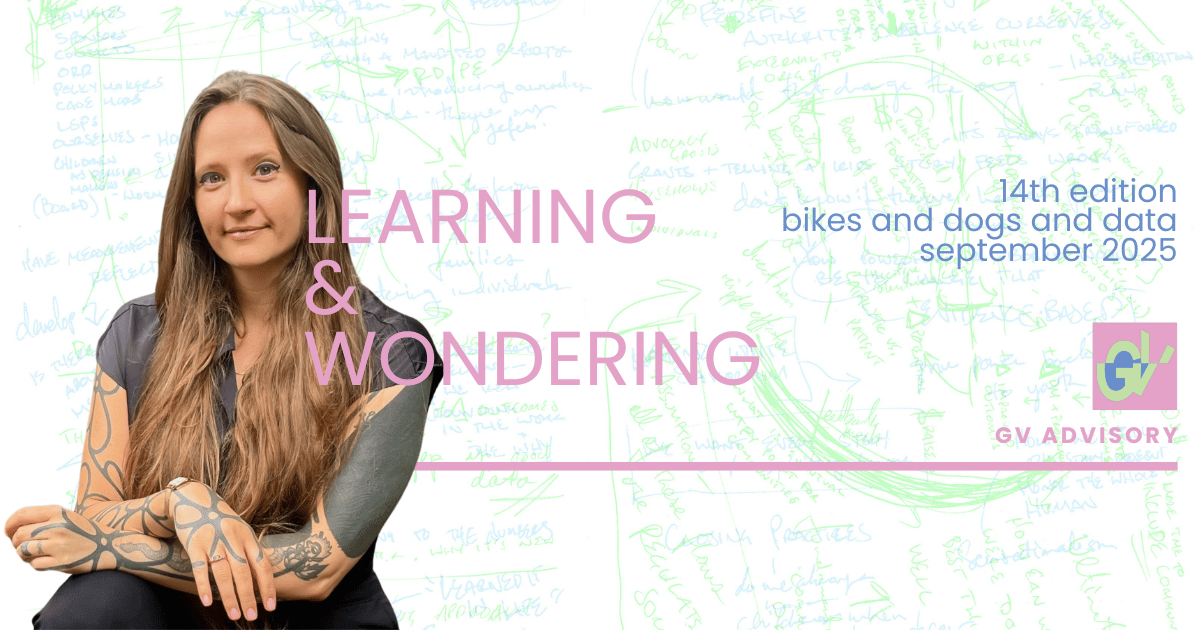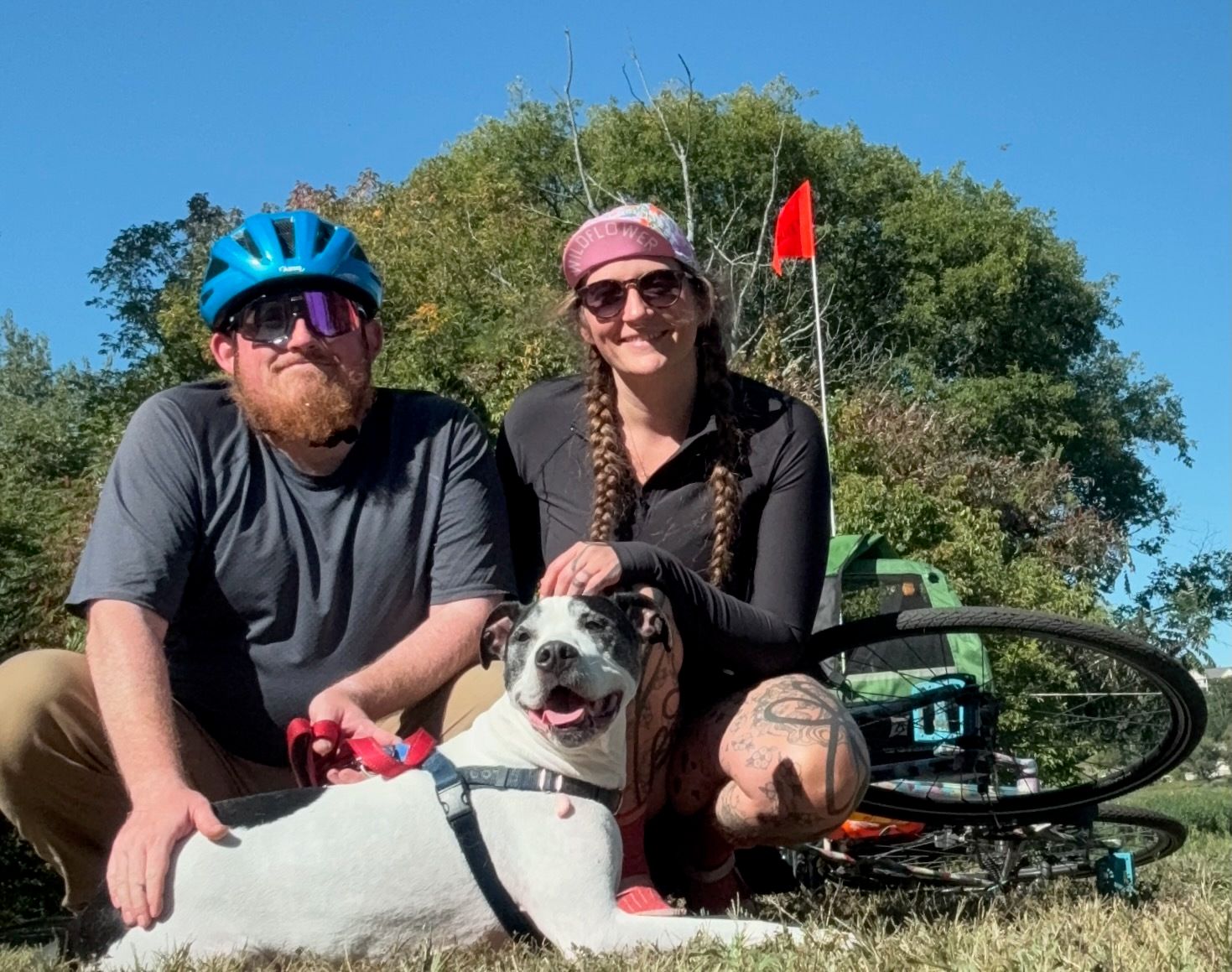- Learning & Wondering
- Posts
- GV in Autumn: bikes and dogs and data
GV in Autumn: bikes and dogs and data
Coming back to the newsletter (which is moving from a monthly newsletter to a sometimes newsletter)!

I’m listening to: Amanda Shires’ Nobody’s Girl. I tend to come back to the americana and bluegrass I’ve loved for a long time in the autumn, so, here we are.
UPDATES:
INDEPENDENT SECTOR & EXPONENT PHILANTHROPY
I’ll be in these places soon. If you’ll be there, write me a note and let’s make time to meet!
Independent Sector’s National Summit: Building Power for Nonprofits and Philanthropy in Atlanta, GA from October 27 - 29: I’ve got the honor of moderating a panel called Data as a Public Good: Balancing Transparency and Privacy with some PRETTY COOL folks - Aleda Gagarin, Vice President of Influence @ Candid, John Mohr, Chief Information Officer @ MacArthur Foundation, Woodrow Rosenbaum, Chief Data Officer @ Giving Tuesday, and Victoria Vrana, CEO @ GlobalGiving.
Exponent Philanthropy’s 2025 Annual Conference in Columbus, OH from November 11 - 13: I’m excited to be a listener in this space and to hear about how other folks are thinking about community leadership and mobilizing resources.
LEARNING:
DATA PRINCIPLES ARE USEFUL
I just wrapped up a project with an arrest support organization here in NYC - our goal was to design some light-touch data collection tools, and they were open enough to accept my invitation to start with defining their data principles before we even talked about which data they needed to collect. This is something I’ve thought was important for a long time, but sometimes it’s nice to hear that it actually is important!
Data Principles, as I work with them, are a set of co-designed principles that help an organization develop guardrails for how they will (and won’t) collect, store, use, and share data. We always go further than simply naming a principle (such as, “we will not participate in or enable surveillance by law enforcement or anyone else”). We work through three key pieces:
Core Assumptions: why is this principle important? Why does this principle matter to us?
How might this principle show up in practice? These principles usually sound nice and mission-aligned - but what do they mean for us on a Tuesday morning? Will implementing this principle change the way we do things? If so, how?
How might this principle impact our decision-making? Will this principle change how we think about which grants we apply for? Will this principle mean we say “no” where we’ve said “yes” in the past? Will this principle have an impact on vendor selection?
It’s simple work, but it helps keep data design work (analysis plans, survey design, etc) grounded in mission, values, and care. Clients have shared that these principles have helped them work with their funders to avoid falling into extractive and harmful data practices for the sake of ‘accountability.’ These principles have helped organizations advocate for autonomy and safety in their data design. I love it!
A SHARED LINE OF SIGHT CAN’T FIX EVERYTHING, BUT IT CAN FIX A LOT
This is an “of course” kind of learning, but still!
I’ve been hearing from a number of Executive Directors and other leaders that they feel overwhelmed and like they’re trying to look through muddy water to understand what’s going on both inside and outside of their organizations. It’s not that they don’t talk to their team - they do! Often! It’s that it’s incredibly hard to hold an entire organization’s worth of work in our heads. I’ve been working with some organizations to implement some shared practices that can support a shared line of sight - sometimes it’s as simple as a weekly standup in Teams, and sometimes it’s a collaborative and transparent work planning process. This, too, is simple - but it’s wild what looking through clear water feels like after you’ve been straining to see through mud and sediment.
It doesn’t fix everything, but wow this work has lessened a lot of leadership anxiety and helped teams collaborate and coordinate where it’s needed.
FINDING JOY (STILL)
Surprise, it’s more bike stuff!
I took the leap and got a dog trailer to hook up to my bike - Dudley and I start our day—weather permitting—by biking to Prospect Park to play and wander in the foggy meadow during early morning off-leash hours, then head to Prospect Park Lake to watch the sun rise, drink water (and coffee), and eat treats before we go home and start work (Duds’ job is to snore in his bed next to my desk).
 Duds and the moon |  foggy Duds |
 sunrise Duds |  Duds and his chariot |
We also went bike camping! #learning the farthest my legs can tow Dudley is about 45 miles if there are hills, and 10% is too steep a grade with a dog and tow and a tight cassette, ha!

family portrait in on a Rail Trail in the Hudson Valley
QUESTION:
How are your organizations thinking about the “invisible” work of org effectiveness and learning right now? Are y’all tending to these areas? Feeling strained in these areas? Send me a message or reply to this email!
ABOUT GV:
Genevieve (they/them) runs GV Advisory - Guided by collaboration, humanity, and joy, they help social impact organizations embrace data and cultivate a learning culture. This work enables organizations to evolve into entities that operate based on evidence and relationship to community. Reach out to Genevieve at [email protected].